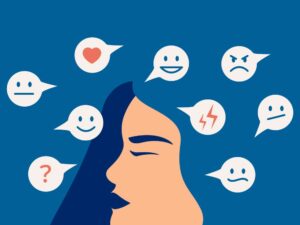Do you ever have thoughts that just won’t go away? Thoughts that keep popping into your head, even when you don’t want them to? These are called compulsive thoughts, and they can be very difficult to stop. In this blog post, we will discuss what compulsive thoughts are, and how you can stop them from happening.
Contents
What Are Compulsive Thoughts?
 Compulsive thoughts are defined as those that cause distress, uncertainty, or discomfort. They can be recurring and intrusive thoughts, such as worries about the future or ruminations on past events. Compulsive thoughts often focus on personal inadequacies or perceived mistakes, leading to self-criticism and rumination.
Compulsive thoughts are defined as those that cause distress, uncertainty, or discomfort. They can be recurring and intrusive thoughts, such as worries about the future or ruminations on past events. Compulsive thoughts often focus on personal inadequacies or perceived mistakes, leading to self-criticism and rumination.
People may find themselves stuck in a cycle of negative thinking that they cannot escape from no matter how hard they try. This can lead to feelings of depression, anxiety, and a general sense of unease. It is important to understand that compulsive thoughts are normal and not always indicative of mental health problems.
However, if the thoughts start to interfere with daily life or cause significant distress it may be worth seeking help from a qualified practitioner. Be sure to speak with a therapist or healthcare professional who can help you manage your thoughts and identify any underlying issues.
What Are Some Examples?
If a person is compulsive thinking, they might be constantly worrying about something that has yet to happen, ruminating over past events, or making assumptions based on little evidence.
Some typical statements a person with compulsive thinking may say are:
- “What if I failed the test?”
- “I can’t believe I said that in the meeting.”
- “Maybe I shouldn’t have gone out last night.”
- “I shouldn’t have told them what I really think.”
Compulsive thinking can also lead to anxiety and depression, as well as physical symptoms such as headaches and stomach aches. And, compulsive thoughts can be hard to turn off, as the person may feel like they must think about them in order to find a resolution.
Examples of compulsive thoughts include:
- “I should have done something differently.”
- “What if I make a mistake?”
- “Everyone is judging me right now.”
- “I don’t know how I can make this problem better.”
- “What if something bad happens?”
These are just a few examples of compulsive thoughts. However, each person may have different types of these thoughts depending on their own unique experience and thought patterns. While it is normal to have intrusive thoughts, if the thoughts become overwhelming, it may be time to seek help from a mental health professional.
Does Anxiety Cause Compulsive Thoughts?
 As compulsive thoughts and thinking can be a part of any type of anxiety disorder, it is important to understand the relationship between anxiety and compulsive thinking. Anxiety can cause a person to have intrusive and unwanted thoughts that lead to compulsive behavior or thinking.
As compulsive thoughts and thinking can be a part of any type of anxiety disorder, it is important to understand the relationship between anxiety and compulsive thinking. Anxiety can cause a person to have intrusive and unwanted thoughts that lead to compulsive behavior or thinking.
In some cases, these thoughts may be linked to fear or worrying about what could go wrong in certain situations. These thoughts may also be linked to trying to control a situation or outcome that is out of the person’s control.
The constant worrying and obsessing over something can be exhausting and tiring, leading to further compulsive behaviors or other forms of rituals. These rituals are often used as a way to try to reduce the person’s anxiety at the moment and can become habits that are difficult to break.
Moreover, anxiety-related compulsive behavior or thinking can be linked to very specific situations, such as being in a crowd or fearful of leaving the house. In these cases, it is important to identify the cause of the anxiety and find ways to address it. With the right understanding of the underlying cause of anxious thinking, you can begin to address it in a more effective way.
What Triggers Compulsive Thoughts?
Compulsive thoughts can be triggered by a variety of different things and situations. Some of the common triggers are listed below:
- Stressful life events, such as a job loss, death in the family, or divorce
- Major changes in routine, such as starting college or changing jobs
- Anxiety and depression
- Drug or alcohol abuse
- Traumatic experiences, such as physical or sexual abuse
- Unrealistic expectations of oneself and others
- Perfectionism
- Self-criticism
- Relationship issues, such as feeling disconnected or unfulfilled
- Feeling overwhelmed by life responsibilities
These triggers can lead to negative thoughts and emotions, which in turn can lead to obsessive thinking. It’s important to recognize the triggers of compulsive thinking so that you can take steps to address the underlying causes.
Working with a therapist or another mental health professional can help you better understand and manage these thoughts. With proper treatment, you can learn how to identify, challenge, and replace compulsive thoughts with healthier ones.
Are Compulsive Thoughts Normal?
Generally, it is normal to experience occasional compulsive thoughts. For example, it may be natural for a person to worry about something that happened in the past or to feel anxious about an upcoming event. It is also common to have obsessive thoughts about certain things and activities, such as one’s career or home life.
In most cases, these thoughts can be managed with healthy coping strategies, such as mindfulness and relaxation techniques. However, when compulsive thoughts become excessive and interfere with a person’s life, it may be time to seek professional help.
Compulsive thinking can manifest in different forms, including:
- ruminating on the same thought or idea
- worrying excessively about things that may or may not happen
- constantly doubting oneself or one’s decisions
- spending too much time thinking about the past or future
- experiencing intrusive thoughts that are difficult to ignore
It is important to remember that everyone experiences different levels of anxiety and stress in life. And what may seem “normal” for one person may be a source of distress for another. If you are feeling overwhelmed by compulsive thoughts, it is important to take steps to seek help and learn healthy coping strategies.
How Do You Stop Compulsive Thoughts?
 When the compulsive thoughts are overwhelming, there are a few steps you can take to help reduce their intensity.
When the compulsive thoughts are overwhelming, there are a few steps you can take to help reduce their intensity.
One way is to practice mindfulness techniques. These are activities that focus on the present moment and allow you to observe your thoughts without judgment or attachment. Mindfulness methods such as meditation, yoga, and journaling can provide a sense of calmness and clarity when dealing with intrusive thoughts.
Another approach is to challenge negative thoughts with more positive ones. This may include writing down a list of all of your accomplishments, strengths, and goals that you are proud of. And can refer to when feeling overwhelmed by compulsive thoughts.
It is also important to make sure that you are getting enough rest and engaging in healthy stress-relieving activities like exercise, spending time with friends and family, or engaging in hobbies. Taking regular breaks throughout the day can also help to reduce compulsive thoughts.
Finally, seek professional help if needed. Talking to a therapist can provide additional coping strategies and help you better manage your intrusive thoughts. A mental health professional may also be able to help you identify underlying issues that may trigger your intrusive thoughts.
By following these strategies, you can take control of your compulsive thoughts and start feeling better. Everyone experiences intrusive thoughts at some point in their life. But with the right support and healthy coping mechanisms, you can learn to manage them and lead a more balanced life.
Conclusion
In conclusion, compulsive thoughts are seemly more and more common in today’s society. It is important to remember that these thoughts are usually temporary and can be managed with the right strategies. Fortunately, there are many tools available such as cognitive-behavioral therapy, mindfulness practice, exercise, and medications to help individuals cope with compulsive thoughts.
Ultimately, it is essential to recognize that these thoughts can be managed and that individuals are not alone in their struggles. By taking steps to better understand these thought patterns, people can work towards living a richer and fuller life.
For more information and guidance, please contact MantraCare. OCD is a mental health disorder characterized by obsessions and compulsions. If you have any queries regarding Online OCD Counseling experienced therapists at MantraCare can help: Book a trial OCD therapy session


